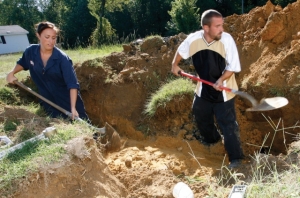Honeydipping 101
By Laura Collins
Published in News on October 5, 2009 2:02 PM

News-Argus/GREG SOUSA
News-Argus reporter Laura Collins, left, and septic tank installer Charlie Holland of Brock's Septic Tank Service dig out saturated soil and replace it with clean sand on a job site in Pikeville.
The Company: Brock's Septic Tank Service
The Job: tank installer and pumper
The Location: Wayne County
The logo on the hat Curtis Brock handed me said, "When Doody Calls." I was sincerely hoping that doody would be too busy to call the day I was working with Brock's Septic Tank Service.
Admittedly, my knowledge of septic tanks is limited. It basically consists of the scene in "Christmas Vacation" where Cousin Eddie empties his RV's tank into the Griswold's sewer. An explosion ensued. So my main goal while working for Brock's Septic Tank Service was to not explode anything. My second goal was to not touch anything.
Brock and I started at a home in Pikeville where a septic tank system was failing. Sewage was running across the driveway. The smell wasn't nearly as bad as I expected, but it definitely wasn't good.
Since the soil was bad, the crew was digging 12 feet deep and putting in sand to replace the soil, then putting in six new lines, a project that in total would take about a week. I was there for the start of it, which involved digging out some old, saturated soil, and replacing it with sand. I chose not to think about what exactly the soil was saturated with. The directions I got before I started working made me a little nervous.
"Watch where you stand. Once you get that in your shoes...." and "Try not to fall in the 12-foot hole" weren't the most reassuring statements I'd heard.
If that location wasn't a testament to the importance of regularly pumping your septic tanks before it gets too late, I don't know what would be.
Our second stop was a trailer park where we were pumping a septic tank.
My job was to empty out the tank using a large hose attached to a truck.
"It's like a large wet/dry vac on wheels," they told me. I usually use a mini wet/dry vac to suck up some lemonade I've spilled. This was not exactly what I pictured using a wet/dry vac for. There was only one near disaster during the entire process when the hose was a lot stronger than I had anticipated. I was pulled forward when the hose first kicked on and almost saw my life flash before my eyes. Had I fallen in that hole it would have definitely marked the end of my time with Brock's and likely the end of my work week, though it was only Wednesday.
After being pumped, lime is mixed with the waste to change the pH and kill the bacteria. That makes it safe to spray on the fields and use as fertilizer. The whole process is state-inspected and approved and requires much more paperwork than I expected. It's a highly regulated process by the health department.
Hearing Brock, who installed his first tank at 14, talk about his family business is refreshing. It was originally started in 1973 by his uncle Buddy Brock and his wife, Margaret. Since then the company has grown, doing everything from septic repairs, pumping and installation to sand and rock hauling. He says they have been blessed in this economy and stayed very busy. He makes or receives about 140 calls a day and racks up about 4,000 cell phone minutes each month.
"I don't think anybody tries any harder to please the customer than we do," Brock said. "And I truly believe in praying, and I pray for this business every day."
